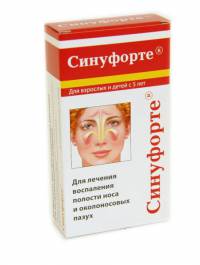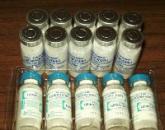Why constantly runny nose. Why there is a constant runny nose and how to treat it
The lifestyle of a large number of people is associated with the constant risk of catching a cold. This is actively promoted not only by viruses and bacteria, but also by the habitat. Constant air and environmental pollution ideally contributes to nasal congestion and mucous discharge. In most cases, rhinitis is treated easily and simply, it is enough to undergo an examination by a doctor who will prescribe an appropriate course of treatment. However, if this is not done, the disease will acquire the status of chronic and will be called differently - a constant runny nose.
Constant runny nose is called chronic inflammation that occurs in the mucous membrane of the nasal sinuses. It is characterized by long duration and difficult to drug therapy. A person suffering from this disease may experience discomfort in the nose for years, expressed by dryness and stuffiness. Application recommended medicines causes only temporary relief, but after that everything starts again. If at the same time for a long time take vasoconstrictor drugs, drops and nasal sprays, the condition of the mucous membrane will only worsen, which will significantly increase the risk of more serious diseases.
Causes of
There are several factors that serve as an impetus for the development of a cold headache. The most common cause is a complication of an infection that was not treated or treated in time. Less common is irritation of the mucous membrane as a result of exposure to toxic substances. However, the causes of persistent runny nose become a consequence of a single process - a structural change in the mucous membrane, formed as a result of acute chronic inflammation.
In cases where a person complains of constant runny nose, cough, heavy discharge mucus and sneezing, it is necessary to conduct a full analysis of its immune status. Only after that the doctor can draw conclusions and prescribe complex therapy for the restoration of health.
The list of reasons capable of initiating the development of this disease is quite extensive:
- cold weather and sudden changes in temperature;
- the appearance of foreign bodies in the nose;
- enlarged adenoids;
- unfavorable ecological situation;
- harmful effects of tobacco smoke;
- hormonal changes;
- spicy food intake;
- injuries of the nasal septum;
- allergic irritants;
- viral infections;
- the formation of polyps in the nose;
Varieties of rhinitis
Experts identify several varieties, each of which has its own unique features.
Catarrhal rhinitis
This form of the disease implies a minimal change in the nasal mucosa and becomes a consequence of not fully cured. It can also occur due to chronic heart, kidney and ENT diseases. Catarrhal rhinitis completely prevents the patient from breathing normally through the nose, and mucous membranes appear from the sinuses or, even worse, mucous membranes. purulent discharge. Edema also appears, headachesneezing and coughing.
Inflammation forms in a short time, gradually making it difficult to breathe through the nose.
Hypertrophic rhinitis
In this disease, the mucous membrane becomes thicker due to persistent inflammation. In some places, it is replaced by connective tissue, which leads to a decrease in the number of vessels in the nose. The flow of blood to the organ of smell is reduced, an impassable congestion arises and appears. Nasal passages are significantly narrowed, making breathing difficult. At the same time, the air entering the lungs is not sufficiently cleaned, warms and moistened, which becomes possible cause the appearance of other respiratory diseases.
Atrophic rhinitis
This form is considered the most severe. The mucous membrane of the nose is almost completely replaced by connective tissue and ceases to perform its functions. In a patient with atrophic rhinitis, there is constant dryness in the sinuses, the complete disappearance of the ability to smell. Because of this, the mucous membrane dries out completely and purulent discharge appears. If atrophic rhinitis is triggered, the lesion process will affect the cartilage tissue and also hit the bone. In this case, it is impossible to do without surgical intervention.
Possible negative consequences
When a person suffering from persistent runny nose does not care about the development and course of the disease, he is more likely to receive other diseases as an addition, which may include conjunctivitis, diseases of the lacrimal system, throat and pharynx, and heart rhythm disturbances. There is swelling and cerebral circulatory failure. As a result of the latter, the brain functions are upset - the concentration of memory and attention is disturbed. This leads to the fact that a person is not able to memorize elementary information and focus on something for a long time.

With the development of rhinitis, many organs on the face are affected, which provokes a variety of diseases.
At the same time, it is necessary to add that this ailment is a constant discomfort, continuous discharge of mucus, nasal congestion, sneezing. In some cases, there is subfebrile temperature, which exhausts in a relatively short period of time.
The very first thing to do is see a doctor. Only a specialist will determine the causes of the appearance and, as a result, identify the form of the disease. This will help prescribe current treatment. It is the appearance factors that influence the development of the ailment and the prescribed therapy.
From so many recipes traditional medicine It is worth refusing, since they are no longer able to help. They can only be used as an additional means to the main therapy, which is carried out with medical preparations. This may be drugs from the following groups:
- means to strengthen the immune system;
- drops for cleansing the nasopharynx;
- drugs that exclude the possibility of recurrence.
Sinuforte is considered one of the most effective drugs.
In the event that it was diagnosed allergic rhinitis, the treatment will take place with the use of antihistamines. It can be Allergodil, Nazoneks, Kromoglin, Fliksonaze. They will help remove congestion and relieve unpleasant sensations.
To narrow the vessels with nasal congestion, the doctor may recommend drops of Tizin, Xymelin, Fazin. Also, treatment can be carried out with other drugs from this group of products.
In case chronic rhinitis manifests itself in the mornings, patients may be assigned homeopathic remediessuch as Sinuforte or Sinupret (eliminate the flow of mucus, coughing and sneezing). When using them, be patient, because they do not help immediately, but have a cumulative effect. This means that the effect of the drug on the body will begin when a certain amount of active substances has been accumulated.
At the moment when a comparative improvement in the condition of the patient will be recorded, you can begin to use steam inhalation (only if there is no temperature). You can breathe over essential oil eucalyptus or mint, boiled potatoes, decoction of chamomile. This will help to remove the swelling and slightly release airways from mucus.
If the development of the disease was started, the doctor prescribes an operation in which the mucous membrane is burned with a laser. If this beam of light cannot help, the tissue overgrown in the nasal cavity is surgically removed.
Persistent runny nose in pregnant women.
This disease, diagnosed in women in the situation, becomes an obvious sign of the development of vasomotor rhinitis, and it is extremely undesirable to allow it during pregnancy. The reasons have already been described above, as well as the symptoms, but it is the situation that plays a significant role. The fact is that the runny nose is accompanied constant sneezing and muscle contraction. In turn, this may provoke early labor.

Constant rhinitis during pregnancy should be treated as soon as possible
In general, the consequences are as follows:
- access of oxygen to the organs of the respiratory system is interrupted, which creates favorable conditions for the development of hypoxia in mucosal tissues. If it is not so bad for the future mother, then for the fetus it can be destructive, since it will not receive enough oxygen in the required volume;
- cerebral cortex ceases to receive oxygen in the required amount, which leads to the appearance of bouts of dizziness, lethargy, fatigue. All this adversely affects the unborn child, there is a risk of deviations;
- nasal congestion forces breath in and out through the mouth. In addition to the fact that the air is not warmed and not cleaned properly, a different infection can enter the body, which will provoke the most different diseases. All this can not be allowed during pregnancy.

Prolonged breathing through the mouth can trigger the development of other diseases.
To minimize the risk of complications, rhinitis should be treated on time, while adhering to the recommendations of the doctors and referring to their own common sense.
Preventive measures
Preventing a head cold will help avoid many of the problems associated with this disease. For this you need:
- time to consult a doctor if you find the first signs of illness;
- eat foods rich in vitamins. This will increase immunity;
- try not to breathe cold air;
- avoid crowded places during epidemics.
Active sports will also help to avoid this disease. Thanks to them, the body can more actively resist external stimuli, bacteria and viruses.
The main thing you need to know is that diagnosis is carried out exclusively by a doctor, treatment is prescribed by him. He also has to control the healing process. It is not recommended to treat a persistent runny nose yourself.
A runny nose is an inflammation of the nasal mucosa, accompanied by secretions. A runny nose may indicate a child’s incidence of acute respiratory diseases or an allergic reaction to a particular irritant. Frequent rhinitis may indicate chronic rhinitis. Therefore, it should not be ignored. It is necessary not only to get rid of the symptoms of a runny nose, but also to find out the cause of its occurrence.
Causes of frequent rhinitis in a child
Types of rhinitis in children:
- Infectious rhinitis. Often caused by viruses or bacteria. They distinguish acute and chronic rhinitis.
- Non-infectious rhinitis. Occurs due to prolonged exposure to the stimulus. Non-infectious or vasomotor rhinitis divided into allergic and neuro-reflex.
Causes of illness can be:
Cold air
Incidence
Allergy to anything
Nasal septum deviation
How to treat a frequent runny nose in a child at home?
In the autumn-winter period, rhinitis is quite common in children. It can be both an independent disease and a companion of influenza, acute respiratory infections or other diseases. Due to its physiological characteristics, even a slight runny nose can make it very difficult for a child to breathe. Therefore, even a minor runny nose must be properly treated. For this you need not only to use medical preparations (drops, ointments, tablets), but also monitor the condition of the air in the room, proper nasal hygiene, and so on.
Many mothers rush to extremes. Some people believe that private rhinitis in a child is an unserious disease and should not be worried, he will pass in a week. Others panic and use all possible means, including medication. Do not rush into panic, but let everything take its course too. Proper treatment and care will help to cope with the illness and will not lead to complications.
Tips for treating frequent children's rhinitis?
Does your baby run out of nose again? With the need to choose a cure for a cold for a child, sooner or later all parents face. Meanwhile, moms and dads understand that there is simply no universal remedy for this ailment. Only an integrated approach can help your child defeat this unpleasant disease. Consider the main ways of dealing with the disease in children.
Constantly ensure that the air in the room where the sick child is located is well-humidified. As often as possible, open the windows, air, regularly do wet cleaning in the nursery. To help your child recover from a cold, use a humidifier. This device can be replaced by wet diapers hanging around the room ..
Nasal passages also need hydration. To do this, you can use saline or oil of thuja, as well as sea water. Spout the child must be periodically flushed, freeing him from the accumulated mucus. It is best to use these remedies for the common cold, such as Aqua Maris, Physiomer.
Having consulted a pediatrician, you need to bury your nose in drops or use folk remedies for instillation of the nose.
Inhalation is also a great way to treat a frequent runny nose in a child. You can make inhalations with the decoctions of various herbs or with mineral water. The main thing - do not forget about precautions. Too hot water is dangerous burning steam, which can damage the lungs of the child, so in any case can not exceed the comfortable temperature.
Aromatherapy and warm baths.
Warm compresses on the nose area.
Prevent overcooling of the body, lead a healthy lifestyle, temper and monitor nasal hygiene.
Effective method against the common cold is acupressure and breathing exercises.
If allergic or neuro-reflex rhinitis should protect the child from contact with an irritant.
Important and effective remedy - plentiful intensive drink. The baby should drink often and in large quantities. In the course should go teas, decoctions, natural juices and various fruit drinks. If the cause of the disease is a viral infection - then it will be very useful to unsolder the patient with lime tea. Such tea not only strengthens children's immunity, it helps to expel the virus from the body.
With a cold child is very hard to fall asleep. If the baby’s head is horizontal, the secreted mucus accumulates in the nose and makes it difficult to breathe freely. To avoid this, you need to try to raise the pillow. You can put in the headboard another pillow, roller or rolled blanket.
A proven way to treat a frequent runny nose in a child - vasoconstrictor agents. Many doctors themselves recommend them to reduce swelling and alleviate the condition of the sick baby. But we must not forget that these drops should be treated very carefully, observe the dosage, frequency and duration of use. If you still decide to use them - do not forget to save the child's nose from the accumulated mucus before instillation. Otherwise, the drops simply will not work.
An old cure for the common cold - dry mustard in children's socks - can give very, very good results.
Combining various means, you can quickly save the baby from painful sensationswhat we wish you.
Even a small manifestation of rhinitis should be treated and not ignored. However, diseases are easier to prevent than to cure them. So do gymnastics, temper the body and lead a healthy lifestyle with your child. And then, all diseases will bypass you and your family side.
Persistent runny nose can be an independent disease. Often a runny nose is aggravated in the winter, in the autumn, because the body adapts to climate change. Strong occurs when an acute respiratory viral infection, if not treated in time, it will eventually develop into a chronic form.
Causes of persistent rhinitis
The symptom is accompanied by a headache, the nose is rubbed and becomes red. Permanent rhinitis is an inflammatory reaction of the nasal mucosa. Most often runny nose provoked by a viral infection.
Reasons for the constant cold include:
- Sharp temperature drops.
- Spicy food abuse.
- Negative exposure to tobacco smoke.
- Unfavorable environmental situation.
A persistent runny nose can be triggered by adenoids, a hit foreign body into the nose. often occurs as a result of trauma to the nose, deviations in the septum. In some situations, a persistent runny nose is caused by an allergic reaction, a tumor or polyps in the nose.
Especially dangerous is the constant runny nose for a child, it negatively affects their lifestyle. The child eats poorly, cannot sleep, he has difficulty breathing.
Forms of constant rhinitis

Typical Cold Symptoms - sneezing, runny nose, swollen mucous membranes of the nose. But the same thing happens with allergies. However, allergic rhinitis is not so simple. It can lead to asthma if allergies are not treated on time. The following tips help distinguish allergies from colds if a runny nose appears.
IN THIS ARTICLE:
There are over 200 rhinoviruses causing the common cold. Up to 20 different types circulate during one season. So it is quite normal that a person in a cold time now and then catches a cold.
Persistent runny nose in an adult - causes (allergy or cold)
Seasonality and regularity
If a cold begins every year at a specific point in the time of the year, for example, in the spring, it is necessary in any case to clarify whether it is an allergy. For example, the reaction to pollen: every fourth adult person knows what it is. If the nose begins to flow in the fall, thoughts of allergies do not occur. But this rhinitis can be immunological, that is, it can be a reaction to dust mites.
The beginning and duration of a cold
If the runny nose began very suddenly, without warning, more suspicion should fall on allergies. A common cold often begins with a headache and a sore throat, and ends with a cold. And all this takes place in about a week. If cold symptoms linger much longer, you need to think about an allergic cause.
Dependence on time and place
If you are allergic to house dust, most allergens attack, usually in a dream. Thus, the most severe allergic reaction occurs in the morning. Symptoms of an allergy to pollen appear outdoors. But pollen can be carried on the hair or clothes in the house and get a cold at home. Pollen can enter the room through an open window. Prolonged rains can wash the pollen out of the air, so that the symptoms of hay fever in rainy weather subside.
But strong winds can release allergens, so before and after a strong wind and thunderstorm, doctors advise to keep the windows closed for several hours. Otherwise, there is a constant runny nose, not only in a child, but also in an adult. The reasons in this case are obvious. Unlike allergies, the common cold does not depend on the weather and location.
Nature of discharge
Attention should be paid to the consistency of nasal discharge: with cold sneezing and runny nose, the discharge is often greenish-yellow and, as a rule, thick. With allergic rhinitis they remain clear and watery.
Additional symptoms
Allergies can be accompanied by an additional itching that covers the nose, eyes and throat. Frequent sneezing many times in a row also speaks in favor of allergies. But if there is a fever or chills, these are more signs of a cold. For persistent coughing for a long time, you should consult a specialist. Coughing can have a variety of causes. It may be the first symptom of onset asthma.
The influence of heredity
If family members have previously suffered from allergies, a genetic predisposition to it is possible. Then there is a high risk of illness for relatives. In this case, a constant runny nose in an adult has the root causes of the genetic code of the ancestor.
Action drugs
For acute allergic symptoms, the doctor may recommend or prescribe antiallergic drugs. These so-called antihistamines begin to act within a short time. Significant relief of symptoms occurs within twenty minutes after ingestion.
In case of a cold, inhalation can help, because it moisturizes the airways and mucus becomes smaller, the increase in secretion in the nose, sinuses and bronchi decreases. Rinsing the nose removes secretions and is especially useful in allergic rhinitis, as it washes away pollen from the mucous membranes.
Cold or allergies? Perhaps both!
If there are symptoms and cold and allergies, this is also possible, because an allergic can easily catch a cold. Cold viruses can also increase asthma attacks. In such severe conditions, recourse to specialists is not only desirable, but necessary.

How to deal with a cold, knowing the reasons
We all know that a runny nose, a viral disease. Immunity must be very good so that the runny nose does not start. With a weakened immune system, a runny nose can be delayed at best for a week, if not treated, the consequences can be very serious. Prolonged runny nose will show all their charms in full. To avoid a constant cold in an adult, it is important to determine its causes, and then - the methods of struggle.
Benefits of homeopathy
Runny nose can and should be treated as soon as the first signs were noticeable. Pharmacies provide a large selection of antiviral drugs, but they do not always help. But homeopathic medicines help many. Well help warming up, washing and inhalation. You can spend them at home. The best antiviral agent there will be a drink of honey, lemon and cranberries, this drink is rich in vitamins. Vitamin C will be the best of vitamins to fight the cold. It boosts immunity and fights viruses. If you have not been diagnosed with gastritis, try to prepare a drink that will raise immunity well. Crush in a blender a lemon with zest, ginger root, cranberries, pour in not too hot water, sweeten with honey. Enjoy a delicious and healthy drink!
Drops
Means such as drops or aerosols are the first effective means, but they are not entirely helpful. Means constrict blood vessels, swelling subsides, the nose will breathe. You can use them, but rarely. Drops are addictive. It will be much more beneficial to buy drops with eucalyptus or fir oils. Such drops have an antibacterial effect, simplify breathing, reduce the secretion of mucus.
Inhalation, physiotherapy, warming
At the pharmacy you need to buy oil of fir or the same eucalyptus. Make baths, adding oil to hot water and breathe under the towel for 5-7 minutes.
Conduct inhalation of herbs: lavender, thyme, chamomile, pine buds and more.
Boil the egg, wrap it in a cloth and apply it to the nose. This method will remove the edema and warm up the area. maxillary sinuses. Get reflex lamps and do physiotherapy at home.
It is important to treat a runny nose to ensure that the common cold does not become chronic sinusitis. This disease is extremely difficult to treat, it gives a lot of inconvenience. Therefore, in the event of a permanent runny nose in an adult, it is necessary to immediately identify the causes and quickly overcome it.
When you have a cold, you are always warm, do not overcool, your feet should not freeze. Feet can be steamed in a basin of hot water with mustard and take a bath with sea salt. After the bath, keep your feet warm.
Follow the simple rules, do not overcool, dress according to the weather, prevent diseases in time and stay healthy!
Persistent runny nose is called chronic rhinitis. It occurs if the rhinitis in acute form was not completely cured.
A runny nose (rhinitis) is an inflammation of the mucous membrane of the nasal cavity, which leads to pathological changes. It must be remembered that chronic inflammation that occurs for a long time without pronounced symptoms is dangerous for the consequences that may arise in the future and is more difficult to treat.
Chronic rhinitis can be atrophic and hypertrophic. When an atrophic rhinitis occurs, the mucous membrane dries out, as a result of which it can no longer function normally, and the person suffers more often.
In hypertrophic rhinitis, the mucous becomes thicker, narrowing nasal cavity. Because of this, a person has to breathe through his mouth, which ultimately will lead to the same consequences, to which nasalness, headache, fatigue and sleep problems will be added.
The unpleasant effects of constant rhinitis are unavoidable, since any chronic inflammation adversely affects the immune system, and is also a permanent source of infection. To solve the problem with a constant cold, you need to cure it once and for all.
The first reason for the constant cold - infection. Especially if it is combined with any of the listed factors:
- Inhalation of very cold or very dry air.
- Dusty and polluted air.
- Tobacco smoke.
- Injuries or congenital disorders of the nasal septum.
- Chronic diseases affecting the blood circulation process.
The second reason chronic rhinitis – allergic reactions. In this case, it is diagnosed. Its appearance occurs during the flowering of trees or herbs. Persistent allergic rhinitis is accompanied by lacrimation, sneezing, but these symptoms disappear when the allergic factor is eliminated.
Also allocate year-round allergic rhinitis. It is associated with household allergens.
The third reason for persistent rhinitis is neurovegetative dysfunction. In this case, runny nose is accompanied by nasal congestion, rhinorrhea, sneezing, which occur with any provocative factor (cold air, stress, fatigue, dust, etc.). In addition, there may be other symptoms of vegetative dystonia.
Other causes of persistent runny nose include hormonal disorders, tumors in the nasal cavity, overgrown adenoids, ingress of foreign bodies.
Possible diseases
Persistent runny nose alternates with periods of exacerbation and remission. During exacerbation, it manifests itself as normal rhinitis, and in a state of remission, the symptoms almost never occur.
Exacerbations of chronic rhinitis occur frequently. Its occurrence can be provoked by such factors as persistent fatigue, reduced immunity, hypothermia.
A persistent runny nose may indicate:
- . It usually develops after acute rhinitis, which was not treated, and in some cases it may be the result of diseases. internal organs (kidney, heart) or diseases of upper respiratory tract (pharyngitis, tonsillitis, sinusitis). Catarrhal rhinitis does not last long and appears periodically. At the same time, it is accompanied by nasal discharge and deterioration of smell.
- Hypertrophic rhinitis. It usually occurs on the background of chronic catarrhal rhinitis. It is accompanied by symptoms such as constantly stuffy nose, discharge of a small amount of mucus. In this case, drugs are often ineffective.
- . It is the last stage of chronic rhinitis. AT inflammatory process cartilage, tissue and bones of the nose are involved. Atrophic rhinitis sometimes appears on the background of rhinoscleroma, frequent acute rhinitis, syphilis, operations, injuries and so on. In this case, dryness in the nose appears, sense of smell is reduced, crusts form in the nasal cavity and constant discharge of pus.

Drug treatment
It is very difficult to completely eliminate permanent chronic rhinitis. Treatment involves several methods.
The traditional method of treatment involves the use of drugs different spectrum of action.
This includes the use of the following medicines:

Persistent runny nose treated with therapeutic methodsthat have a local impact. These include physiotherapy, laser therapy, cryotherapy.
If the treatment did not have the desired result, and the runny nose still remained, then you have to resort to surgery.
Treatment of folk remedies
- A solution of sea salt. Take one teaspoon of salt, dissolve it in a glass of warm water. Add half a spoon of soda and five drops of iodine. Use for rinsing the nose.
- Laundry soap. Carefully soap your finger with soap and lubricate the nasal passages. The procedure is carried out three times a day.
If you wash your nose in such a way every day for prophylaxis during washing, then the risk of developing rhinitis is nil.

Prevention
In order to prevent the recurrence of a constant cold, you need to pay attention to the following prevention recommendations:
- Maintain optimum conditions in the room: the temperature is eighteen to twenty degrees, the humidity is sixty to seventy percent.
- Regularly ventilate the room and carry out wet cleaning.
- Temper the body.
- Drink plenty of water, eat rationally.
- Timely treat acute respiratory viral infections and acute respiratory infections.
- In the period of colds and flu do inhalation.
Video
findings
If you do not treat a persistent runny nose, it can lead to serious consequences and complications. To cure a cold can be quickly and easily. But for this you need to find out the cause of its occurrence and nature.
For the treatment of rhinitis can use both drugs and folk remedies. But it is better to use them in the complex.
What is the most effective spray for a cold will tell this. And you can read about Dioxidine with a cold.
Popular
- Breast cancer is curable at any stage.
- The remedy for the cold Sinupret
- Azitrox - official instructions for use
- Chicken-bjaka: allowed antibiotics were found in Russian chicken
- Oral Cancer: Symptoms and Treatment
- Dark and thick blood during menstruation.
- Modern analogues of doxycycline tablets
- Is it possible to die from pneumonia
- What earwax will tell all about your health
- Tussin: instructions for use



